特殊疑问句基本结构
特殊疑问句基本结构
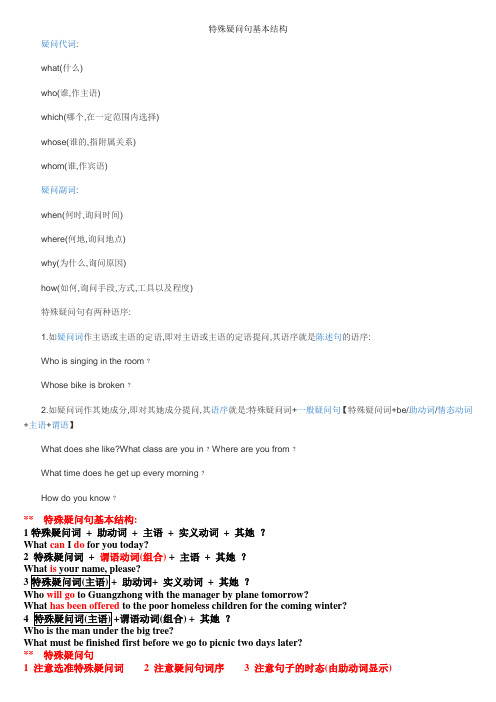
疑问代词:what(什么)who(谁,作主语)which(哪个,在一定范围内选择)whose(谁的,指附属关系)whom(谁,作宾语)疑问副词:when(何时,询问时间)where(何地,询问地点)why(为什么,询问原因)how(如何,询问手段,方式,工具以及程度)特殊疑问句有两种语序:1.如疑问词作主语或主语的定语,即对主语或主语的定语提问,其语序就是陈述句的语序:Who is singing in the room﹖Whose bike is broken﹖2.如疑问词作其她成分,即对其她成分提问,其语序就是:特殊疑问词+一般疑问句【特殊疑问词+be/助动词/情态动词+主语+谓语】What does she like?What class are you in﹖Where are you from﹖What time does he get up every morning﹖How do you know﹖** 特殊疑问句基本结构:1特殊疑问词+ 助动词+ 主语+ 实义动词+ 其她?What can I do for you today?2 特殊疑问词+ 谓语动词(组合) + 主语+ 其她?3助动词+ 实义动词+ 其她?to the poor homeless children for the coming winter?4 谓语动词(组合) + 其她?What must be finished first before we go to picnic two days later?** 特殊疑问句1 注意选准特殊疑问词2 注意疑问句词序3 注意句子的时态(由助动词显示)What When Where Why How Which Who Whose WhomWhat + 名词Which + 代词/ 名词How + 形容词/ 副词Whose + 名词介词+ whom** 助动词1 be类am is are was were2 will类will would shall should3 have类have has had4 can类can could may might must need ought to dare5 do类do does did原句中谓语动词中包含有1~4类中其中一个,它即问句助动词。
特殊疑问句的基本构成有两种情况

特殊疑问句的基本构成有两种情况:1. 疑问句+一般疑问句结构。
这是最常见的情况。
例如:What′s your grandfather′s telephone number?你爷爷的电话号码是多少?Who is that boy with big eyes?那个大眼睛的男孩是谁?Which season do you like best?你最喜欢哪个季节?When is he going to play the paino?他什么时候弹钢琴?Where does he live?他住在哪儿?How are you?你好吗?How old are you?你多大了?How many brothers and sisters do you have?你有几个兄弟姐妹?2. 疑问句+陈述句结构。
这时疑问词作主语或修饰主语。
例如:Who is on duty today?今天谁值日?Which man is your teacher?哪位男士是你的老师?我们学过的What/How about+名词/代词+其他?也是特殊疑问句,它是一种省略结构。
例如:I like English. What/How about you?我喜欢英语。
你呢?What about playing basketball?打篮球怎么样?下面我来帮大家归纳一下所学过的特殊疑问句。
What′s this/that?What are these/those?What′s...?What class/grade is/are sb. in?What′s...plus/minus...?What can you see...?What colour is/are...?What do/does sb. like?What is/are sb. doing?What do/does sb. usually do...?What day is it today?How is/are sb.?Who′s on duty today?Who is/are sb.?Whose...is this/it?How old is/are sb.?How many...are there...?How much is/are...?How/What about?How do/does sb. go to school/work...?When is...?Where is/are sb. from?Where is/are...?Which man/woman/boy/girl is...?。
特殊疑问句的构成与回答方式
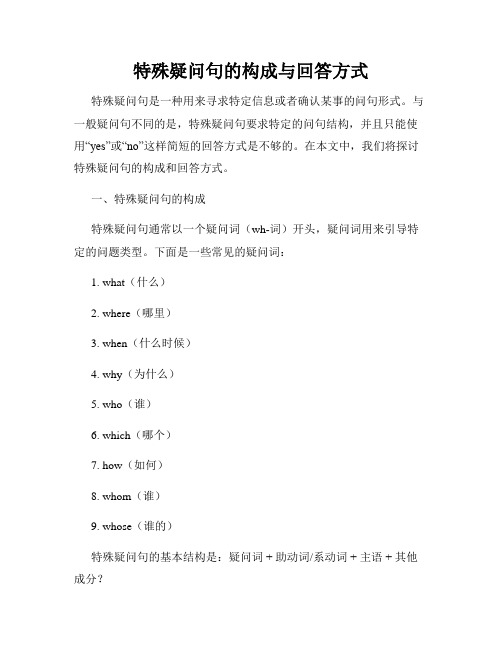
特殊疑问句的构成与回答方式特殊疑问句是一种用来寻求特定信息或者确认某事的问句形式。
与一般疑问句不同的是,特殊疑问句要求特定的问句结构,并且只能使用“yes”或“no”这样简短的回答方式是不够的。
在本文中,我们将探讨特殊疑问句的构成和回答方式。
一、特殊疑问句的构成特殊疑问句通常以一个疑问词(wh-词)开头,疑问词用来引导特定的问题类型。
下面是一些常见的疑问词:1. what(什么)2. where(哪里)3. when(什么时候)4. why(为什么)5. who(谁)6. which(哪个)7. how(如何)8. whom(谁)9. whose(谁的)特殊疑问句的基本结构是:疑问词 + 助动词/系动词 + 主语 + 其他成分?例如:- What is your name?(你叫什么名字?)- Where do you live?(你住在哪里?)- When is the meeting?(会议在什么时候?)- Why did you choose this university?(你为什么选择这所大学?)- Who is your best friend?(谁是你最好的朋友?)- Which book do you prefer, fiction or non-fiction?(你更喜欢哪种书,小说还是非小说?)- How do you go to work every day?(你每天如何上班?)- Whom did you meet yesterday?(昨天你见了谁?)- Whose bag is this?(这是谁的包?)二、特殊疑问句的回答方式特殊疑问句要求提供详细的回答,不允许只用“Yes”或“No”来回答。
对于不同类型的特殊疑问句,回答方式也不尽相同。
接下来我们将介绍各种特殊疑问句的回答方式。
1. 问事物的特征或描述:常用回答方式有提供具体信息或详细描述。
例如:- What is your favorite color?My favorite color is blue.(我的最爱的颜色是蓝色。
英语 特殊疑问句 成分划分
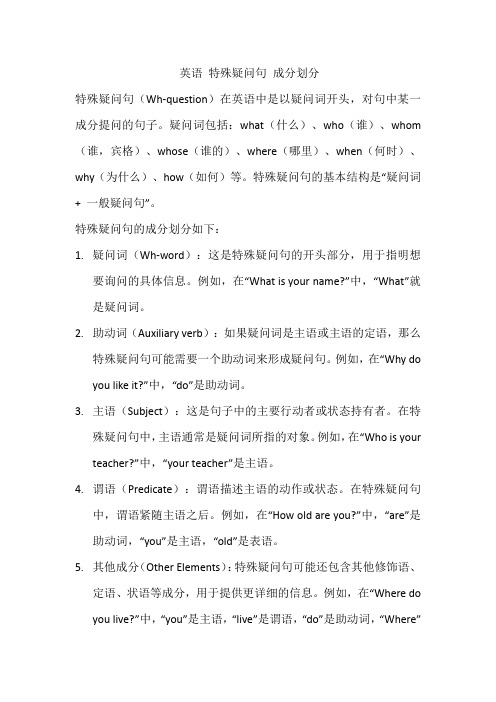
英语特殊疑问句成分划分特殊疑问句(Wh-question)在英语中是以疑问词开头,对句中某一成分提问的句子。
疑问词包括:what(什么)、who(谁)、whom (谁,宾格)、whose(谁的)、where(哪里)、when(何时)、why(为什么)、how(如何)等。
特殊疑问句的基本结构是“疑问词+ 一般疑问句”。
特殊疑问句的成分划分如下:1.疑问词(Wh-word):这是特殊疑问句的开头部分,用于指明想要询问的具体信息。
例如,在“What is your name?”中,“What”就是疑问词。
2.助动词(Auxiliary verb):如果疑问词是主语或主语的定语,那么特殊疑问句可能需要一个助动词来形成疑问句。
例如,在“Why do you like it?”中,“do”是助动词。
3.主语(Subject):这是句子中的主要行动者或状态持有者。
在特殊疑问句中,主语通常是疑问词所指的对象。
例如,在“Who is your teacher?”中,“your teacher”是主语。
4.谓语(Predicate):谓语描述主语的动作或状态。
在特殊疑问句中,谓语紧随主语之后。
例如,在“How old are you?”中,“are”是助动词,“you”是主语,“old”是表语。
5.其他成分(Other Elements):特殊疑问句可能还包含其他修饰语、定语、状语等成分,用于提供更详细的信息。
例如,在“Where do you live?”中,“you”是主语,“live”是谓语,“do”是助动词,“Where”是疑问词,“do you live”是整个句子的宾语部分。
特殊疑问句基本结构
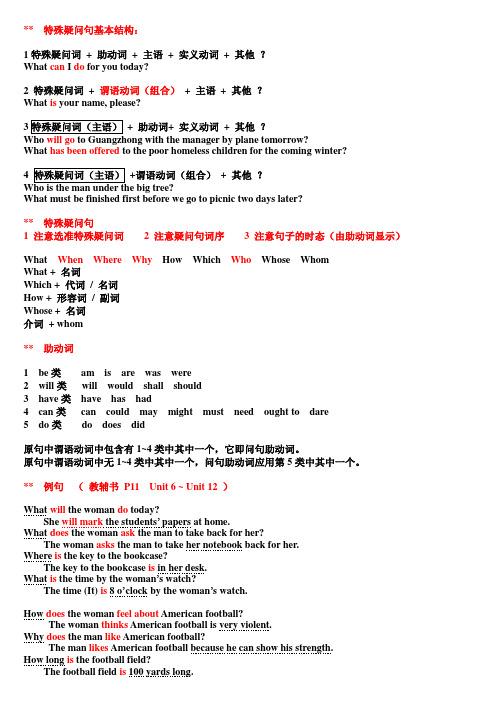
** 特殊疑问句基本结构:1特殊疑问词+ 助动词+ 主语+ 实义动词+ 其他?What can I do for you today?2 特殊疑问词+ 谓语动词(组合)+ 主语+ 其他?What is your name, please?3+ 助动词+ 实义动词+ 其他?What has been offered to the poor homeless children for the coming winter?4 +谓语动词(组合)+ 其他?What must be finished first before we go to picnic two days later?** 特殊疑问句1 注意选准特殊疑问词2 注意疑问句词序3 注意句子的时态(由助动词显示)What When Where Why How Which Who Whose WhomWhat + 名词Which + 代词/ 名词How + 形容词/ 副词Whose + 名词介词+ whom** 助动词1 be类am is are was were2 will类will would shall should3 have类have has had4 can类can could may might must need ought to dare5 do类do does did原句中谓语动词中包含有1~4类中其中一个,它即问句助动词。
原句中谓语动词中无1~4类中其中一个,问句助动词应用第5类中其中一个。
** 例句(教辅书P11 Unit 6 ~ Unit 12 )What will the woman do today?She will mark the students’ papers at home.What does the woman ask the man to take back for her?The woman asks the man to take her notebook back for her.Where is the key to the bookcase?The key to the bookcase is in her desk.What is the time by the woman’s watch?The time (It) is 8 o’clock by the woman’s watch.How does the woman feel about American football?The woman thinks American football is very violent.Why does the man like American football?The man likes American football because he can show his strength.How long is the football field?The football field is 100 yards long.What is at either end of a football field?Goal lines and goals posts are at either end of a football field.What is at either end of a soccer field?A net is at either end of a soccer field.How does the woman feel about the man?The woman thinks the man really knows a lot about football and soccer.1 女士为什么给男士打电话?2 男士去年做了什么?3 Paul 是谁?4 男士这个学期的问题是什么?5 女士所在的俱乐部多长时间开一次会?6 女士说她星期一将要做什么?1 Why does the woman call the man?She wants to invite him to join a club.2 What did the man do last year?He did some work helping out in a river restoration project.3 Who is Paul?Paul is a friend of the two speakers and a member of the environment club.4 What is the man’s problem this semester/term?He is short of time.5 How often does the woman’s club have meeting?(The woman’s club has a meeting) Once a week.6 What does the woman say she will do on Monday?She will call the man to remind him about/of the meeting.。
特殊疑问句基本结构

疑问代词:what(什么)who(谁,作主语)which(哪个,在一定范围内选择)whose(谁的,指附属关系)whom(谁,作宾语)疑问副词:when(何时,询问时间)where(何地,询问地点)why(为什么,询问原因)how(如何,询问手段,方式,工具以及程度)特殊疑问句有两种语序:1.如疑问词作主语或主语的定语,即对主语或主语的定语提问,其语序是陈述句的语序:Who is singing in the room﹖Whose bike is broken﹖2.如疑问词作其他成分,即对其他成分提问,其语序是:特殊疑问词+一般疑问句【特殊疑问词+be/助动词/情态动词+主语+谓语】What does she like?What class are you in﹖Where are you from﹖What time does he get up every morning﹖How do you know﹖** 特殊疑问句基本结构:1特殊疑问词+ 助动词+ 主语+ 实义动词+ 其他?What can I do for you today?2 特殊疑问词+ 谓语动词(组合)+ 主语+ 其他?What is your name, please?3+ 助动词+ 实义动词+ 其他?What has been offered to the poor homeless children for the coming winter?4 +谓语动词(组合)+ 其他?What must be finished first before we go to picnic two days later?** 特殊疑问句1 注意选准特殊疑问词2 注意疑问句词序3 注意句子的时态(由助动词显示)What When Where Why How Which Who Whose WhomWhat + 名词Which + 代词/ 名词How + 形容词/ 副词Whose + 名词介词+ whom** 助动词1 be类am is are was were2 will类will would shall should3 have类have has had4 can类can could may might must need ought to dare5 do类do does did原句中谓语动词中包含有1~4类中其中一个,它即问句助动词。
特殊疑问句的基本句型
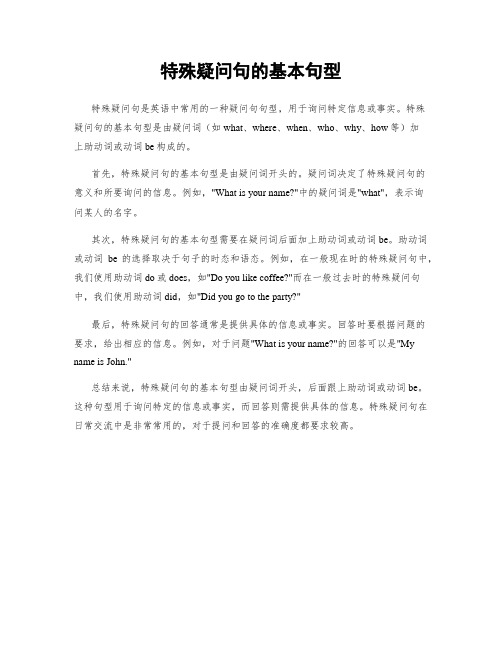
特殊疑问句的基本句型
特殊疑问句是英语中常用的一种疑问句句型,用于询问特定信息或事实。
特殊
疑问句的基本句型是由疑问词(如what、where、when、who、why、how等)加
上助动词或动词be构成的。
首先,特殊疑问句的基本句型是由疑问词开头的。
疑问词决定了特殊疑问句的
意义和所要询问的信息。
例如,"What is your name?"中的疑问词是"what",表示询
问某人的名字。
其次,特殊疑问句的基本句型需要在疑问词后面加上助动词或动词be。
助动词或动词be的选择取决于句子的时态和语态。
例如,在一般现在时的特殊疑问句中,我们使用助动词do或does,如"Do you like coffee?"而在一般过去时的特殊疑问句中,我们使用助动词did,如"Did you go to the party?"
最后,特殊疑问句的回答通常是提供具体的信息或事实。
回答时要根据问题的
要求,给出相应的信息。
例如,对于问题"What is your name?"的回答可以是"My name is John."
总结来说,特殊疑问句的基本句型由疑问词开头,后面跟上助动词或动词be。
这种句型用于询问特定的信息或事实,而回答则需提供具体的信息。
特殊疑问句在日常交流中是非常常用的,对于提问和回答的准确度都要求较高。
英语特殊疑问句的构成
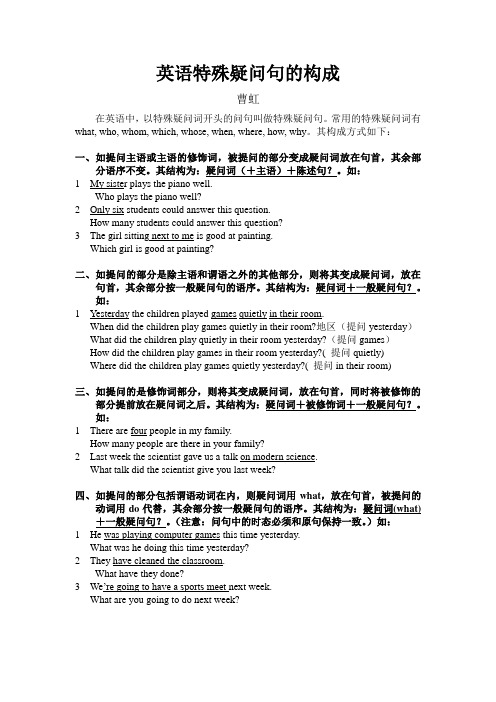
英语特殊疑问句的构成曹虹在英语中,以特殊疑问词开头的问句叫做特殊疑问句。
常用的特殊疑问词有what, who, whom, which, whose, when, where, how, why。
其构成方式如下:一、如提问主语或主语的修饰词,被提问的部分变成疑问词放在句首,其余部分语序不变。
其结构为:疑问词(+主语)+陈述句?。
如:1My sister plays the piano well.Who plays the piano well?2Only six students could answer this question.How many students could answer this question?3The girl sitting next to me is good at painting.Which girl is good at painting?二、如提问的部分是除主语和谓语之外的其他部分,则将其变成疑问词,放在句首,其余部分按一般疑问句的语序。
其结构为:疑问词+一般疑问句?。
如:1Yesterday the children played games quietly in their room.When did the children play games quietly in their room?地区(提问yesterday)What did the children play quietly in their room yesterday?(提问games)How did the children play games in their room yesterday?( 提问quietly)Where did the children play games quietly yesterday?( 提问in their room)三、如提问的是修饰词部分,则将其变成疑问词,放在句首,同时将被修饰的部分提前放在疑问词之后。
- 1、下载文档前请自行甄别文档内容的完整性,平台不提供额外的编辑、内容补充、找答案等附加服务。
- 2、"仅部分预览"的文档,不可在线预览部分如存在完整性等问题,可反馈申请退款(可完整预览的文档不适用该条件!)。
- 3、如文档侵犯您的权益,请联系客服反馈,我们会尽快为您处理(人工客服工作时间:9:00-18:30)。
特殊疑问句基本结构Revised on November 25, 2020
:
what(什么)
who(谁,作主语)
which(哪个,在一定范围内选择)
whose(谁的,指附属关系)
whom(谁,作宾语)
:
when(何时,询问时间)
where(何地,询问地点)
why(为什么,询问原因)
how(如何,询问手段,方式,工具以及程度)
特殊疑问句有两种语序:
1.如作主语或主语的定语,即对主语或主语的定语提问,其语序是的语序:
Who is singing in the room﹖
Whose bike is broken﹖
2.如疑问词作其他成分,即对其他成分提问,其是:特殊疑问词+【特殊疑问词+be//++】What does she likeWhat class are you in﹖Where are you from﹖
What time does he get up every morning﹖
How do you know﹖
** 特殊疑问句基本结构:
1特殊疑问词 + 助动词 + 主语 + 实义动词 + 其他
What can I do for you today
2 特殊疑问词 + 谓语动词(组合) + 主语 + 其他
助动词+ 实义动词 + 其他
谓语动词(组合) + 其他
What must be finished first before we go to picnic two days later
** 特殊疑问句
1 注意选准特殊疑问词
2 注意疑问句词序
3 注意句子的时态(由助动词显示)What When Where Why How Which Who Whose Whom
What + 名词
Which + 代词 / 名词
How + 形容词 / 副词
Whose + 名词
介词 + whom
** 助动词
1 be类 am is are was were
2 will类 will would shall should
3 have类 have has had
4 can类 can could may might must need ought to dare
5 do类 do does did
原句中谓语动词中包含有1~4类中其中一个,它即问句助动词。
原句中谓语动词中无1~4类中其中一个,问句助动词应用第5类中其中一个。
** 例句(教辅书 P11 Unit 6 ~ Unit 12 )
What will the woman do today
She will mark the students’ papers at home.
What does the woman ask the man to take back for her
The woman asks the man to take her notebook back for her.
Where is the key to the bookcase
The key to the bookcase is in her desk.
What is the time by the woman’s watch
The time (It) is 8 o’clock by the woman’s watch.
How does the woman feel about American football
The woman thinks American football is very violent.
Why does the man like American football
The man likes American football because he can show his strength.
How long is the football field
The football field is 100 yards long.
What is at either end of a football field
Goal lines and goals posts are at either end of a football field.
What is at either end of a soccer field
A net is at either end of a soccer field.
How does the woman feel about the man
The woman thinks the man really knows a lot about football and soccer.
1 女士为什么给男士打电话
2 男士去年做了什么
3 Paul 是谁
4 男士这个学期的问题是什么
5 女士所在的俱乐部多长时间开一次会
6 女士说她星期一将要做什么
1 Why does the woman call the man
She wants to invite him to join a club.
2 What did the man do last year
He did some work helping out in a river restoration project.
3 Who is Paul
Paul is a friend of the two speakers and a member of the environment club.
4 What is the man’s problem this semester/term
He is short of time.
5 How often does the woman’s club have meeting
(The woman’s club has a meeting) Once a week.
6 What does the woman say she will do on Monday
She will call the man to remind him about/of the meeting.。
